Helena P. Schrader's Blog, page 28
December 11, 2020
"Fighter Command will cease to exist by the end of the year.” -- An Excerpt from "Where Eagles Never Flew"
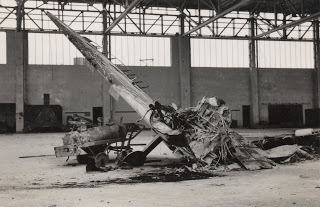
(Setting: An Operational Training Unit following a fatal accident: Early August 1940)
Kennel was waiting for him as he slipped to the ground. “The police have already found him.” Priestman just looked at Kennel, not daring to form the question. “Flew straight in at an estimated 300 miles an hour.”
“I wasn’t flying 300 miles an hour.”
“Maybe not but Acting Pilot Officer Taylor apparently was. Come back up to my office with me.” As they started across the field, the other trainee pilots clustered around. They all looked shocked and shaken. Kennel sent them away. “Stand down. There’ll be no more flying today – or lectures.”
“Is there any hope, sir?” One of the youngsters asked.
“No. He’s been found dead.” Kennel led Priestman into his office. The Adjutant handed a glass of scotch to him.
Priestman took it and sipped at the golden liquid unhappily. He didn’t know what to say.
“There will be an enquiry, of course. The Met was wrong. I shouldn’t have opened the airfield. You should have returned sooner. God knows what Acting Pilot Officer Taylor should have done – but it wasn’t to fly into a mountain at 300 mph.” He paused, sighed. “I’ll write to the next-of-kin. Can you give me all the details you have on Taylor?” This latter was addressed to the adjutant, who nodded. “Anything you can add?” Kennel asked Priestman.
“He was…” Priestman searched for words to describe a young man he had known barely a week. “… insecure. He kept trying to cover it up with bravado.”
“Do you think he’d drunk too much last night?”
“Very likely. I wasn’t with them, but they crashed in late enough.”
“We’d better talk to one or two of the others about that.”
“What does it matter now? You’re not going to put that in the letter to his next-of-kin,” Priestman added a little alarmed.
“No, but it might help with the enquiry.”
Priestman had already forgotten about that, but he supposed this would be the death knell to his career. He’d barely survived the last enquiry. They were bound to throw him out now. God help him, he’d be drafted into the Army!
His expression of foreboding was so explicit that it moved Kennel to remark, “Look, Priestman, there’s no need to look as though you expect to be hanged. We all bear a share of the blame, but things like this happen in training all the time. Flying is dangerous. Flying Spitfires is very dangerous. Give a bunch of teenage boys an extremely fast, powerful aircraft, and the instinct of half of them is to crash it one way or another. It doesn’t help that the Hun is killing, on average, three to four of our pilots every day. Fighter Command needs trained replacements, and it needs them sooner rather than later. If we close down every time conditions aren’t ideal, we’ll either not deliver enough pilots soon enough or we’ll deliver untrained pilots to the operational units – and the Huns will have even more of a field day shooting them out of the sky.”
“That’s over a hundred pilots a month,” Priestman remarked slowly, as he registered what Kennel had just said.
“And half again that many hospitalised,” Kennel added.
“You’re telling me Fighter Command casualties last month were roughly 150 pilots?” Priestman wanted confirmation. “That’s more than six full squadrons.”
“Yes, it is.”
“At that rate, it doesn’t matter how many of them we shoot down. Fighter Command will cease to exist by the end of the year.”
Kennel only shrugged in acknowledgement. They stood there in silence, and now they could hear rain pelting against the windows and the wind howling as a full gale tore down from the Irish Sea. They were all thinking the same thing: the Germans hadn’t even started their main assault yet.
Click here to see a video teaser of Where Eagles Never Flew
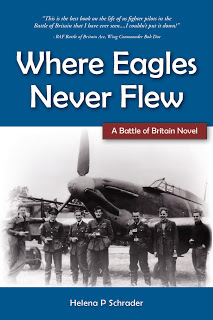
Buy Now!
Buy on Amazon!
December 4, 2020
The Battle of Britain: The Cost
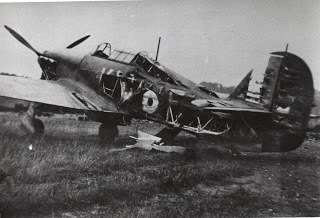
In retrospect — or from the perspective of the government — the price of victory in the Battle of Britain was clearly affordable. During the Battle of Britain, the RAF lost 1,023 aircraft compared to the Luftwaffe’s loss of 1,887 aircraft. In fact, due to the dramatic increases in aircraft production introduced by Lord Beaverbrook, the RAF ended the Battle with more front-line fighter aircraft than it had at the start of the Battle. In contrast, the Luftwaffe’s fighter strength declined by 30%. The imbalance in personnel losses was even greater: while the Luftwaffe lost 2,698 airmen during the battle (killed, wounded and captured), the RAF lost 544 pilots killed. (The number of RAF pilots taken prisoner during the Battle, which largely took place over English soil, was negligible, while the majority of wounded RAF pilots also later returned to active service and, therefore, do not weigh in the balance.)
Yet these statistics are deceptive. It must be remembered that pilots at the time were highly trained specialists who could not be easily or rapidly replaced. While the numbers were small compared to the total population, the pilot losses nevertheless represented roughly 40% of Fighter Command’s strength.
What this meant, is that from the perspective of the participants, chances of survival were barely greater than 50%. The situation was aggravated by the fact that, as a rule, the more experienced pilots had a 5-6 times greater chance of surviving than did the replacement pilots coming into the front line with very little flying and no combat experience. The most critical period for a replacement pilot was his first fortnight in the front-line squadron.
In consequence, there were a significant number of pilots who fought throughout the Battle (four full months) and survived, but many other pilots who did not survive four hours. This meant, in effect, that a smallish core of experienced pilots often watched waves of replacements arriving and then being shot-down in a short space of time. Meanwhile, sheer exhaustion wore down even the experienced pilots and by the end of the Battle it was the Squadron Leaders, Flight Lieutenants and Section Leaders who were falling victim as a result of inattention, and “sloppy flying.”
For an individual squadron engaged in the Battle of Britain the pilots who were seriously injured and hospitalised also had to be replaced, so the effective casualty rate (killed and wounded) at squadron level was closer to 70% than 50%. This situation forced ACM Dowding and AVM Park to pull entire squadrons out of the front line (i.e. 11 Group) and replace them with new squadrons when a certain — albeit very subjective — level of exhaustion and depletion had been reached. Altogether 16 squadrons were withdrawn from 11 Group in the one month between August 8 and September 8, 1940.
The problem with this rotation was that the replacement squadrons — like replacement pilots — were far more likely to suffer casualties and far less likely to destroy enemy aircraft than the tired but experienced squadrons. This was because the replacement squadrons often had no pilots with experience of the combat conditions reigning in Southeast England at the time. Without experienced leaders, these fresh squadrons were often mauled badly during their first encounters with the Luftwaffe. It was not uncommon for these squadrons to lose 5 – 6 aircraft and 3 – 4 pilots in a single engagement.
Click here to see a video teaser of Where Eagles Never Flew

Buy Now!
Buy on Amazon!
November 27, 2020
“It would be a nice change not to be outnumbered ten to one.” -- An Excerpt from "Where Eagles Never Flew"
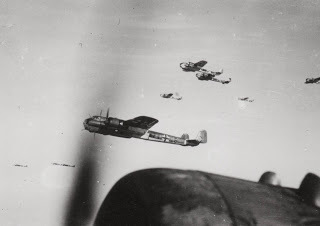
(Setting: RAF Tangmere: A new pilot observes his comrades, Late August 1940)
The telephone went. The eruption of swearing was truly vile – not just rude but vehement. The clerk was absent for some reason, so the CO grabbed the receiver himself, still chewing. He managed a mere, “MMM.”
The others waited absolutely still, staring at him. He gestured with his hand for them to relax and they audibly unwound, starting to eat and drink more calmly. The CO was nodding. “Um hum. Um hum. OK. Thanks, Bridges.”
“Well?”
“Hornchurch was hit while 54 was still on the ground. They lost a whole section – though not the pilots, it seems – and Biggin Hill was struck again. Second time today. They also gave Debden, North Weald and Croyden a pasting. It seems Jerry really is going for the airfields around London. 12 Group was asked to patrol London and the 11 Group ‘dromes while the squadrons refuelled, but they failed to show up in time.”
“Typical 12 Group,” a man with a posh accent commented.
“Leigh-Mallory thinks his squadrons are more effective if they are flown in a wing. He likes to send them in together,” the CO explained.
“Well, I like that idea. It would be a nice change not to be outnumbered ten-to-one!”
“We never are out-numbered by that many, Woody,” the CO countered very seriously. “And the odds are identical whether we deploy in big wings or squadrons. The difference is at best psychological, and frankly I much prefer things the way they are.”
“Why?” the New Zealander asked bluntly, and by the nodding around the dispersal, Ainsworth had the impression they all wanted to know.
“Because large gaggles just get in each other’s way. Look at the 109s. We generally have somewhere over thirty or even sixty of the buggers up there when we attack, but when it comes down to it, we only fight with about a score. The others never get a chance.”
“Maybe, but frankly, once – just once – I’d like to face them on equal terms.”
----
Click here to see a video teaser of Where Eagles Never Flew

Buy Now from Itasca!
Buy on Amazon
October 24, 2020
Opening New Doors -- Cross Seas Press signs with Itasca

This month I signed a contract with Itasca Books for the distribution of titles released under my new imprint Cross Seas Press. The significance of this arrangement is that it enables the books to be sold in brick-and-mortar bookstores, museums, airports etc. rather than just via online platforms, as has been the case up to now. In short, it opens doors to greater sales, although it by no means ensures them.
The first step in this process is the release of the selected titles by Cross Seas Press, a process which will take up to six weeks. When the books are ready, I will provide a link to the Itasca website, where the books can be ordered directly. The books will also go back up on the familiar online platforms at that time, tentatively mid-November.
Three of the titles that will be released with Cross Seas Press are my recent releases: Envoy of Jerusalem, Rebels against Tyranny and The Emperor Strikes Back. In addition, to mark the 80th anniversary of the Battle of Britain, I will be releasing a new edition (with photos) of Where Eagles Never Flew (aka Chasing the Wind)
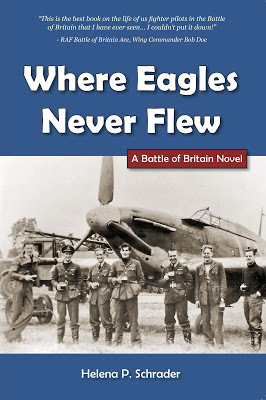
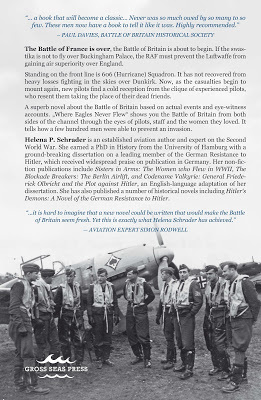
You can find out more about Cross Seas Press by visiting the website at: http://crossseaspress.com
October 6, 2020
The Battle of Britain: The Nazi Juggernaut vs a Handful of British Amateurs
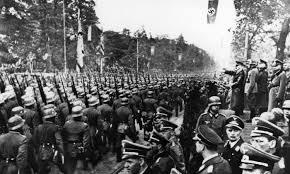
A purely objective assessment of the Battle of Britain does not explain why interest in the Battle of Britain remains so high 80 years later. There were, after all, many other decisive battles in WWII from Stalingrad to Midway. The appeal of the Battle of Britain is less military and diplomatic than emotional.
In the summer of 1940, the RAF stood against an apparently invincible enemy, a juggernaut of seemingly huge proportions, while RAF Fighter Command was tiny -- and largely composed of 18-22 year-old amateurs hastily inducted! Even including the foreign pilots flying with the RAF, there were only roughly 1,200 trained fighter pilots. (Numbers varied due to training, casualties and recruiting.) They were anything but "cannon fodder." Although very few of them were "regulars," because the process of learning to fly to the proficiency required took more than a year, fighter pilots represented a cadre that could not be readily replaced. The RAF had to beat the Luftwaffe with the few men it had.
Churchill – as so often – captured the sentiment of his countrymen when he claimed that “never in the field of human conflict has so much been owed by so many to so few.” This image of a small “band of brothers” standing up to a massive and invincible foe in a defensive battle for their homeland was reminiscent of other heroic battles – Henry V at Agincourt, Edward the Black Prince at Poitiers, Leonidas and his 300 at Thermopylae. Such battles, pitting a few defenders against a hoard of enemy, have always appealed to students of history and readers of historical fiction like almost nothing else.
Click here to see a video teaser of Where Eagles Never Flew

If you wish to pre-order a copy, please send me an email at: info@CrossSeasPress.com
October 3, 2020
“What chances do you give the RAF of defeating the Luftwaffe?” -- An Excerpt from "Where Eagles Never Flew"
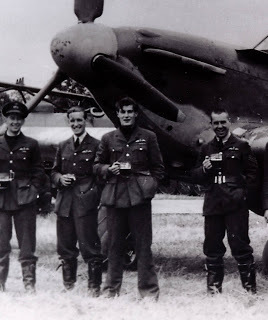
(Setting: Operational Training Unit Harwarden: Early August 1940)
As they approached the Spitfire, one of the Americans caught sight of the approaching officers and rushed over. “Flight Lieutenant Priestman? Howard Briggs, Detroit Times. Pleasure to meet you. We’ve been hearing some great things about you.”
“All lies, then, I can assure you.”
The American started and then laughed heartily. “Love your English sense of humour! Wonderful!” He jotted something down, and Kennel raised his eyebrows at Robin. “Tell me about this kill of yours, Mr. Priestman.”
“What kill?”
“Didn’t you shoot down a Do17 the other night?”
“Yes, I shot down a Dornier 17, a twin-engine, monoplane aircraft of German manufacture. Maximum speed 250 mph – or thereabouts – range roughly 1,500 miles. All four crewmen aboard survived.”
“Uh-huh. Would you tell us about it?”
“What?”
“About the dogfight,” Briggs pressed him, a touch exasperated by Priestman’s evident reticence.
“There was no dogfight. The Dornier is not a fighter and had no fighter escort. I intercepted an enemy intruder and, in accordance with standing orders, I did my best to shoot it down. This time I was lucky.”
“How?”
“The Spitfire is equipped with eight Browning machine guns. They are quite effective. I suggest you inspect the wreckage of the Dornier for evidence of their impact.”
“Love to, but your police or Home Guard or whatever it is won’t let us near it. Top Secret. You make it sound very easy, Mr. Priestman – what’s that expression you boys use, ‘piece of cake,’ eh?” How silly it sounded in that American accent, and Robin resented the reporter even more. The reporter was continuing belligerently, “The way we hear it, Nazi planes are flying over here night after night – heard bunches of them myself – and most of them go home unmolested.”
“Have you ever flown at night?”
“Once or twice.”
“Did you find it easy to see other aircraft in the darkness?”
“Uh. I don’t think I tried. But, look, don’t you Brits have some sort of top-secret tracking device for locating aircraft?”
“I’ve heard rumours, but I wouldn’t know.”
“You mean you don’t have any means of tracking the enemy aircraft?” The second reporter, who had not introduced himself, asked with open hostility.
The reporters struck Robin as vultures. Both seemed to be hunching over their pads with their pencils poised, ready to tear him apart. “We have the Observer Corps – extremely efficient and dedicated volunteers, mostly ex-service men and women from the last war. I highly recommend visiting one or more of our observer stations – particularly on a dark night.”
It took them a moment to digest that answer and then Briggs asked, “What chances do you give the RAF of defeating the Luftwaffe?”
“None.” There was a collective gasp – and not just from the reporters. Kennel at once tried to intervene, “Now just a minute, Priestman—”
“In case you haven’t noticed, we are not attacking Germany. We don’t have to defeat the Luftwaffe. All we have to do is convince the German government that it is not worth their while trying to conquer England.”
“And you think you can do that?” the second reporter insisted skeptically.
Priestman looked at the reporter and considered his answer carefully. Then he smiled. “Let me put it this way, gentlemen. I would not want to trade places with a Luftwaffe pilot for anything in the world.”
“Why not? Don’t you think their planes are as good as yours?”
“The Me109 is a very good aircraft. I was shot down twice by 109s.”
“Then why wouldn’t you want to trade places with a Luftwaffe pilot?”
Priestman shrugged and jammed his fists deeper in his pockets. The photographer lifted his heavy camera to his face and with a flash, a photo immortalised the moment. Robin stood in front of his Spitfire staring into the camera, with a plaster over his left eye and his hair falling over the right. “Never fancied getting my arse shot off for a dictator.”
Robin was deadly serious, but for some reason the others all found the answer terribly funny.
--------
Click here to see a video teaser of Where Eagles Never Flew
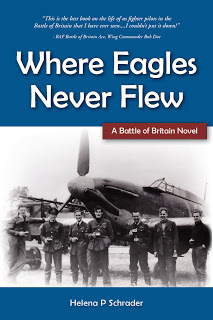
If you would like to pre-order a copy send me an email at: info@CrossSeasPress.com
September 29, 2020
The Battle of Britain: Diplomatic Significance
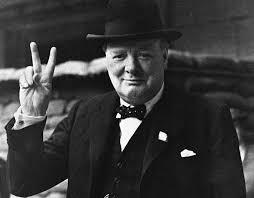
The Battle of Britain was more than a military victory. It was a critical psychological and diplomatic victory as well. The psychological impact of defeating the apparently invincible Luftwaffe was enormous at the time. The RAF had proved that the Luftwaffe could be beaten, and by inference that the Wehrmacht could be beaten as well.
This fact alone encouraged anti-Nazi resistance movements and kept hope alive all across occupied Europe. Even more important, however, was the effect on the United States. At the start of the Battle, the United States had largely written off Britain as a military and political power. As a result of British tenacity and defiance in the Battle of Britain, the United States revised its opinion of British strength. Because of the Battle of Britain, the U.S.A. shifted its policy from ‘neutrality’ to ‘non-belligerent’ assistance.
With American help, Britain was able to keep fighting until Hitler over-extended himself in the Soviet Union. If the United Kingdom had lost the Battle of Britain, it is unlikely that it could have provided assistance to the Soviet Union, and even less likely that the United States would have been drawn into the European war. Without American help, it is improbable that Hitler would have been defeated. In short, the Battle of Britain was the necessary pre-requisite for future victory in Europe.
Click here to see a video teaser of Where Eagles Never Flew
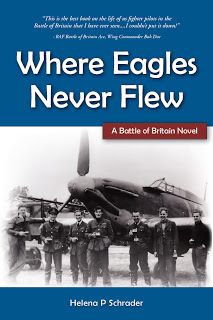
If you would like to pre-order a copy send me an email at: info@CrossSeasPress.com
September 26, 2020
The Last 300 RAF Fighters - An Excerpt from "Where Eagles Never Flew"
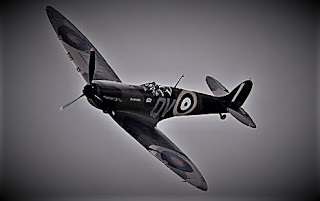
(Setting: Jagdgeschwader 53 participates in the Luftwaffe’s Attacks of August 15, 1940)
The Intelligence Officer had said that the steady attrition in RAF Fighter Command over the last month had reduced the number of operable fighters down to less than half their Order of Battle. The remaining 300 or so fighters were naturally concentrated in the southeast, to protect the approaches to London and the narrowest parts of the Channel. Taking advantage of this fact, the Luftwaffe had designed today’s raids to exploit British weakness across the rest of the island. This was the main reason raids had been launched from Norway – to show the English people how vulnerable they were north of the Trent.
According to the Intelligence Officer, the British people had no idea that the Luftwaffe possessed bombers and fighters (this was where the Me110s were truly valuable) with the range to attack the British Isles from Norway. When Edinburgh, York and Durham went up in flames, he told his audience, they would learn. As for this particular late afternoon raid, the Intelligence Officer had explained, it might not be such a surprise to the British that Devon and Cornwall were within range of the Luftwaffe operating from Northern France, but it ought to frighten them to realise they had no defences any more.
Ernst very much hoped that Luftwaffe Intelligence was correct and there were no defences in this region. Then they would go in and out without opposition. Christian would be disappointed if that happened, of course, Ernst thought with a glance towards his leader. Christian was still itching to get a confirmed kill.
The ragged English coast lay ahead of them in the late afternoon sun. Ernst could clearly see a peninsula that hung like a hook into the Channel with a deep harbour behind it. He tried to remember the map they’d been shown, and decided it was Poole.
“Indians to the left.”
“That’s to the west. I thought they didn’t have any fighters in the west anymore?” Christian commented helpfully, and Ernst groaned inwardly. Why couldn’t he just leave it be? They could all see that Intelligence had been wrong – again.
“Shut up, Feldburg. Follow me down.” Hartman knew that Bartels had had his ears blistered for delaying his attack three days ago. He clearly wasn’t going to make the same mistake. Besides, if the RAF was decimated, one could hardly justify waiting for more targets.
Ernst registered that he was tense again – so much for routine. He felt the need to urinate the minute he realised that the English fighters sweeping towards them were Spitfires. Ernst hated Spitfires.
--------------
Click here to see a video teaser of Where Eagles Never Flew
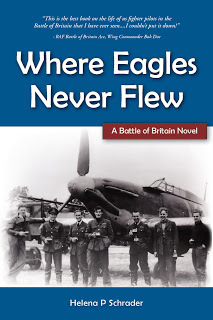 If you would like to pre-order a copy, please send me an email at: info@CrossSeasPress.com
If you would like to pre-order a copy, please send me an email at: info@CrossSeasPress.com
September 22, 2020
The Battle of Britain: The Military Significance
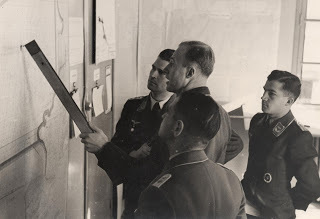
For Hitler, the failure to defeat the Royal Air Force in the summer of 1940 was an annoyance rather than a major strategic set-back. He had long declared his preference to have Great Britain as an ally. He had hoped the British would not ‘interfere’ with his invasion of Poland. He had expected the British government to sue for peace after the fall of France. When the Luftwaffe proved incapable of creating the conditions for an invasion, Hitler turned his attention back to his long-held goal of invading the Soviet Union. The war against the Soviet Union was Hitler’s passion; the war against the British Empire was an irritating complication about which he lost little sleep. To this day, most Germans have never even heard of the Battle of Britain, and if they have, they attribute to it no major significance.
Yet for Britain, the United States, Occupied Europe, and later even the Soviet Union, the significance of the Battle of Britain can hardly be over-stated.
Although Hitler had not expected it would be necessaryto invade England, he had been prepared to do so. Likewise, while neither the German Navy nor Army were keen about a cross-channel invasion, they dutifully made the necessary preparations. Their reluctance would not have stopped Hitler from ordering the invasion of England had he chosen to do so. However, it was agreed within the German High Command that the Luftwaffe would pave the way for an invasion by establishing air superiority over Britain. It was hoped — and perhaps assumed — that the air attacks would drive the British government to the negotiating table.
It was only as the costs of the air fighting mounted and the British government remained intransigent that Hitler made the decision to postpone the invasion indefinitely. This decision was taken on September 17, mainly as a result of the air fighting on September 15. The furious and tenacious defense of English airspace on September 15, 1940 proved that the RAF was far from defeated.
The victory was not immediately apparent. The Luftwaffe continued to attack Britain on a smaller scale by day and neither German troops nor barges were withdrawn from the channel ports until the spring of 1941. Furthermore, the night “Blitz” of London continued savagely throughout the winter. The British people did not feel safe from invasion until the Wehrmacht had turned its attention to the Soviet Union in the summer of 1941.
Yet the RAF had failed to discourage Hitler from his plans to invade Britain, the course of the war would inevitably have been different. A German invasion would have been launched. Whether the Royal Navy, seriously weakened by the losses incurred at Dunkirk and dangerously over-stretched trying to protect the Atlantic lifeline, could have stopped it remains questionable. Certainly, the British ground forces lacked tanks and artillery for fighting the heavily mechanized Wehrmacht if it successfully came ashore. Churchill was not only being rhetorical when he spoke about fighting a guerrilla war against the invaders!
Thus, in retrospect, we know that the Battle of Britain is what saved the British Isles from a Nazi invasion and very likely from Nazi occupation.
Click here to see a video teaser of Where Eagles Never Flew
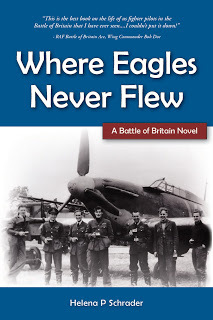
If you would like to pre-order a copy send me an email at: info@CrossSeasPress.com
September 19, 2020
"Once more onto the breach, dear friends" -- An excerpt from "Where Eagles Never Flew"

(Setting: Pilots of an RAF Squadron deployed to France at readiness.)
The squadron commander did a double-take before he recognised Priestman. “I say! What’s happened to you?”
“What hasn’t happened, sir? – bombed, dive-bombed, strafed, played ambulance to civilian casualties and slept in the open – and I didn’t have a change of clothes or a razor with me.”
“Right. Well, your batman packed some of your kit for you.” Sharp was looking around, watching the rest of the squadron land, making dispositions in his mind. “Not much here, is there?”
“No, sir. Who’s missing?”
“Sergeant Putnam is dead; Ned is still missing. He may be a POW, but we don’t know. At least no one’s found his body yet.” This said, Sharp strode away towards the Lysander, from which the Flight Sergeant was emerging.
...
He sensed it more than anything. Then the sun blinked. “BREAK!”
They were all over the place. At least 20 of them. They fell out of the sun. One minute they were nothing but a winking of the light, and the next they were blotting it out entirely while their wings lit up with flashes. The smoke of tracer smudged the sky, and then Yellow Three started spewing black smoke. Wasn’t that Roger? Whoever it was, he flipped over on his back and started downwards. More Robin didn’t have a chance to see, because he yanked his own Hurricane instinctively into a tight turn and was temporarily blinded as the blood drained from his head.
Priestman unhooked his oxygen mask and shoved the hood back before he landed, gulping in the fresh air. When he set down on three points, he thought he had never in his life been so glad to have ground under him. He was aware of a pulsing headache and his eyes felt swollen in their sockets. He taxied absently to the side of the field, too tired to notice if someone was signalling him somewhere else. He cut the engine and pulled off his helmet, and ran his hand through his hair – it was wet and sticky.
He heard someone pant up beside him. “Robin?” He glanced over; it was Roger Ibbotsholm. So he hadn’t been in Yellow Three after all.
“Aye, aye.” Robin was having trouble unclipping his straps for some reason.
Roger was on the wing and bent over to help him. “Are we glad to see you! We thought you’d bought it.”
“They did rather catch us out again. Is everyone else back?”
“The CO’s gone for six. Flamed out and went straight in from 10,000. Guy had to hit the silk over Seclin. Driver swears he saw a parachute land just beside the field and so he’s almost certainly a POW. Shakespeare says Spotty didn’t make it either – crate flamed before he could get out.”
Douglas and Sellers reached Priestman. They too were panting, having run over from the far side of the field. “Are you all right, sir?”
“I’ve got a terrible headache, actually,” Robin admitted rubbing his forehead.
“There’s a ruddy great hole in the back of your seat, sir!”
“Oh, that. Yes. Good thing about the armour plating.”
“You can say that again, sir!”
...
Shakespeare woke him in the dark. “Time to get up, Robin.”
“What time is it?”
“Time to get up.”
“What time is that?”
“If you insist on the ugly details: 4.25 am. The lorry will be in the square in 5 minutes.”
“Dawn Patrol.”
“Isn’t that the name of a flick?”
“With David Niven, I think.”
“I don’t think it had a very good ending.”
“Not for everyone.”
....
The telephone was ringing in the ops tent. They turned their heads and stared at it, waiting.
“Maybe it is just someone ringing up to see how the weather is over here.”
“Or someone calling to ask if there is anything we lack?”
“Maybe someone has just signed a surrender.”
No, it didn’t look like that. Yardly was standing in the entry, waving furiously at them.
“Once more unto the breach, dear friends, once more,” Shakespeare intoned as he set his mug aside.
“Shut up!” Roger told him irritably – much too irritably. You could tell his nerves were a bit frayed. He’d had an ugly belly landing the other day and hadn’t been the same since, really.
“What’s the matter?” Driver asked innocently.
Yardly was shouting at them to “get cracking,” but they ignored him. After all, he wasn’t flying, and they didn’t presume it would make much difference to the war if they were a minute or two later. It was all a cock-up, anyway.
“It’s the next line,” Priestman explained to Driver, putting his own mug aside carefully.
“What’s that?”
“‘Or close the wall up with our English dead.’”
--------------
Click here to see a video teaser of Where Eagles Never Flew
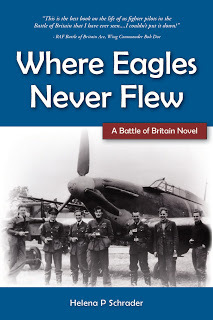 If you wish to pre-order a copy, please send me an email at: info@CrossSeasPress.com
If you wish to pre-order a copy, please send me an email at: info@CrossSeasPress.com



